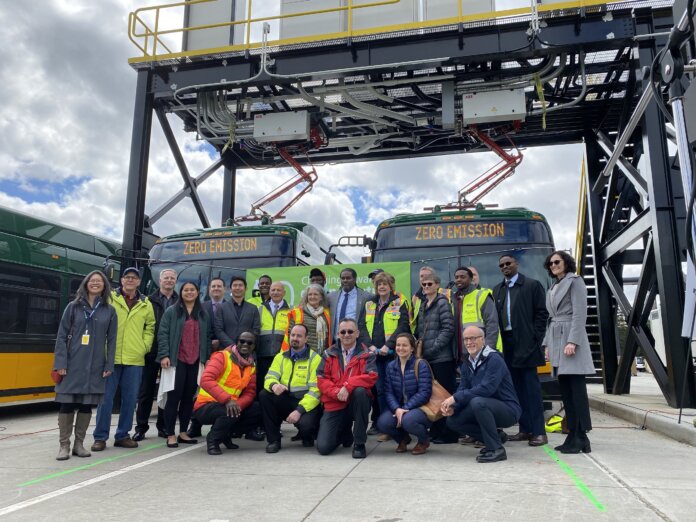The Mobility House has fully commissioned an intelligent charging and energy management solution that will reduce the total cost of ownership for Washington-based King County Metro’s new electric bus charging pilot by over $1 million.
The charging infrastructure pilot at the South Base Test Facility was intentionally designed by King County Metro to test the capabilities of high-power plug-in and overhead chargers from three manufacturers – ABB, Siemens and Heliox – in support of their ambitious electrification plans to achieve a 100% zero-emissions fleet by 2035. Metro leveraged The Mobility House’s energy and charge management solution ChargePilot for its compatibility with all three brands of charger, as well as its cost-saving load management and smart-charging capability.
“We applaud King County Metro for its commitment to bus fleet electrification, and we look forward to supporting them over the long term as they scale up to meet their goals over the next decade,” says Gregor Hintler, The Mobility House’s U.S. managing director. “Their pilot program is an innovative demonstration of the value of interoperability and smart charging and energy management. This flexible approach can be a model that will further propel the transition to electric buses throughout the U.S.”
Taking into account transit routes, operating times, local utility prices and power capacity, The Mobility House’s ChargePilot strategically optimizes fleet charging schedules to secure the lowest electricity cost while still ensuring the ongoing availability of each electric bus. Based on Seattle City Light’s local territory rates developed in conjunction with Metro, ChargePilot is anticipated to save Metro at least an estimated $9,457.20 per month on average in operating expenses.
The new chargers have a combined nameplate capacity of 4.63 MW, making it the largest transit bus charging station in the United States. As a result of modeling and evaluating the project goals (timelines), the test facility chose 2.5 MW of transformer capacity. The cost to upgrade the transformer could have cost Metro $900,000 to $1 million and might have taken longer than two years to complete. Instead, ChargePilot’s local controller works to intelligently manage charging load and keep onsite power usage below the facility’s transformer limitation, obviating the need for utility upgrades and saving project time and money.
“In collaboration with The Mobility House, we will be able to experiment with and learn from a variety of hardware solutions that we believe will help us achieve our long-term electrification goals,” mentions Kevin Kibet, the manager of the project for King County Metro.





